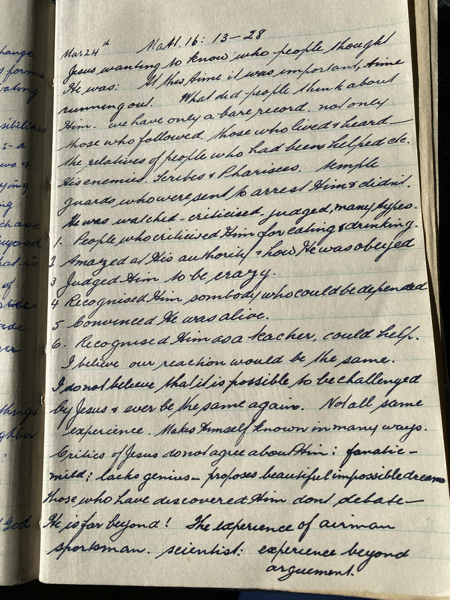Jack Baker: Meditations
My grandfather, Jack Reginald Baker (1911-1990) was a farmer and a Methodist (later Uniting) church lay minister. He kept various diaries and notebooks throughout his lifetime. One of these are his meditations on bible passages that I believe he kept to assist in his preparation for weekly sermons and other religious services.
This website is dedicated to transcribing these meditations.
Grandpa had been acting as a lay minister since 1928 when he joined the ‘Pimpinio Methodist Christian Endeavour Society’, initially helping out other ministers with parts of a service and soon after taking services on his own.
He continued to take services in and around Horsham, in country Victoria, Australia from this time until soon before his passing. In August 1940, he began taking down a record of every service he led. He estimated that he had led around 100 services prior to this date. His records show that between August 11th 1940 and his final entry on May 28th 1989, he had officiated at 966 services.
The meditations on bible passages on this webpage are from a notebook that begins in 1968. I will slowly update entries as I find the time.
With love, Steven John Baker
Preface: Notes by my Grandfather from the start of his journal about how he came to be a lay minister
During the year 1928, the Rev. F. Jenkin invited my sisters and I to join the Pimpinio Methodist Christian Endeavour Society. At that time, as far as I can remember, there were 10-15 members.
The Endeavour Society immediately appealed to me and I remained a member until it finished sometime about 1946. The meetings consisted of devotional, social and other activities. There were Societies at West Wail, Kalkee and Horsham which visited from time to time. There was also a Preaching Band that conducted services at various places. On one occasion, one of the members took ill and I was invited to take part, from then on I have taken an active part: for awhile we had two Bands and were known as Pimp CE No.1 and No.2. After a time, I started to conduct services on my own. For a number of years I kept no written record, as I saved the Quarterly Plan. This went on until 1940.
One evening, the Rev. H.B. Freeman showed me a note book which his father had written, in it was a record of his father’s services and other events. The idea appealed to me very much and from then on I have kept a record of the number of services, the dates and preaching places. At that time, I had over 40 Quarterly Plans and as space to keep them was limited, I decided to get rid of them. When I last referred to them, I found that I had taken part in 100 services.
Table of Contents
March 10th 1968
Mark. 9:14-29 (JB Phillips Translation)
Jesus heals an epileptic boy
9:14-15 - Then as they rejoined the other disciples, they saw that they were surrounded by a large crowd, and that some of the scribes were arguing with them. As soon as the people saw Jesus, they ran forward excitedly to welcome him.
9:16 - “What is the trouble?” Jesus asked them.
9:17-18 - A man from the crowd answered, “Master, I brought my son to you because he has a dumb spirit. Wherever he is, it gets hold of him, throws him down on the ground and there he foams at the mouth and grinds his teeth. It’s simply wearing him out. I did speak to your disciples to get them to drive it out, but they hadn’t the power to do it.”
9:19 - Jesus answered them, “Oh, what a faithless people you are! How long must I be with you, how long must I put up with you? Bring him here to me.”
9:20 - So they brought the boy to him, and as soon as the spirit saw Jesus, it convulsed the boy, who fell to the ground and writhed there, foaming at the mouth.
9:21 - “How long has he been like this?” Jesus asked the father.
9:22 - “Ever since he was a child,” he replied. “Again and again it has thrown him into the fire or into water to finish him off. But if you can do anything, please take pity on us and help us.”
9:23 - “If you can do anything!” retorted Jesus. “Everything is possible to the man who believes.”
9:24 - “I do believe,” the boy’s father burst out. “Help me to believe more!”
9:25 - When Jesus noticed that a crowd was rapidly gathering, he spoke sharply to the evil spirit, with the words, “I command you, deaf and dumb spirit, come out of this boy, and never go into him again!”
9:26 - The spirit gave a loud scream and after a dreadful convulsion left him. The boy lay there like a corpse, so that most of the bystanders said, “He is dead.”
9:27-28 - But Jesus grasped his hands and lifted him up, and then he stood on his own feet. When he had gone home, Jesus’ disciples asked him privately, “Why were we unable to drive it out?”
9:29 - “Nothing can drive out this kind of thing except prayer,” replied Jesus.
Note: According to Dad (Ian Baker), Grandpa’s bibles of choice were: JB Phillips translation of the gospels and the King James Bible for the rest of the bible. I will attempt to link to the same texts throughout.
Jack Reginald Baker, 10th of March 1968
What is your idea of a miracle?
Jesus is reported to have done many wonderful things; blind see, lame people able to walk, deaf cured, dead raised, storm shilled, 5000 people fed. Some people take Bible literally…others!
St. Mark writes of a strange incident early in Christs ministry. At a synagogue, where people gathered to worship, Jesus taught, amazed at his authority. Jesus spoke with finality—words and deeds amazed. A man caused disturbance. Jesus cured, no longer did what he didn’t want to do. No spell, formula, rite, power in Jesus. Did he believe in demons? Don’t know! He did cure people who did act unnaturally.
It seems to me Jesus had remarkable power, tempted to use it; challenged to use it. He had to sort out how he would use it. This not demonstration of power, did not just want to impress people, used in response to human need. Jesus performed for some and not for others, why? No easy answer. Not always [the to] answer a man’s deepest needs.
Demon possession?! People believed in it, did Jesus? I don’t know. Mark recorded two cures in different ways. What are we to believe? What is the truth? Wrong to believe all—foolish to believe none. Missionary who has no difficulty in believing, because he saw how Jesus would change lives.
Blind acceptance is questionable. Not forced to accept.
My own view, do not reject, but seek for meaning. Is it God’s nature? Should we say a thing is impossible if it is hard to understand? Why shouldn’t God do in one act what He normally lets mankind do slowly by degrees? Through a doctor he heals, through a scientist sounds can be heard, the human family all different. God’s world. He sometimes intervenes. Faith recognises them as acts of God, it doesn’t make them acts of God.
We are all free to make our own decisions about miracles. Not forced to accept. I believe that (through) trying to find the meaning, I have made wonderful discoveries of God. Do not close the mind.
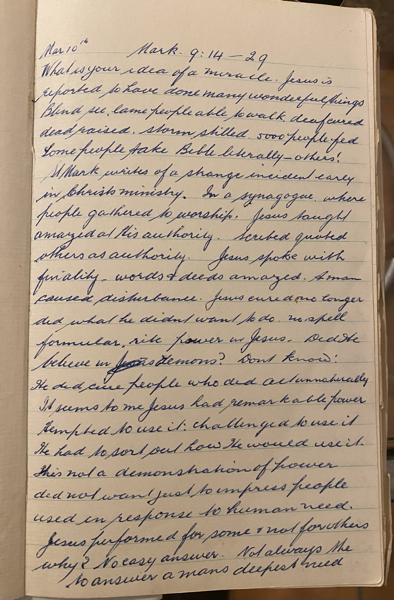
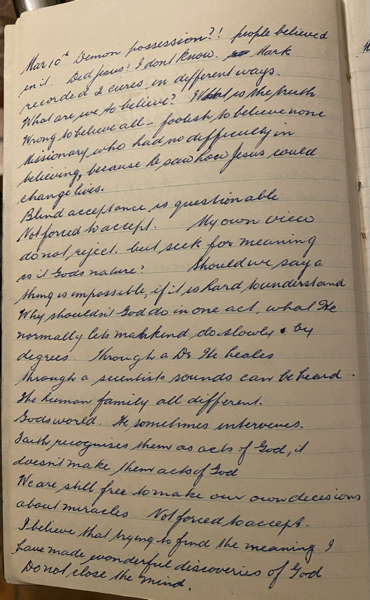
March 17th 1968
Luke. 4:16-30 (JB Phillips Translation)
Jesus begins his ministry in Galilee
4:14-15 - And now Jesus returned to Galilee in the power of the Spirit, - and news of him spread through all the surrounding district. He taught in their synagogues, to everyone’s admiration.
4:16-19 - Then he came to Nazareth where he had been brought up and, according to his custom, went to the synagogue on the Sabbath day. He stood up to read the scriptures and the book of the prophet Isaiah was handed to him. He opened the book and found the place where these words are written - ‘The Spirit of the Lord is upon me, because he has anointed me to preach the Gospel to the poor. He has sent me to heal the brokenhearted, to preach deliverance to the captives and recovery of sight to the blind, to set at liberty those who are oppressed, to preach the acceptable year of the Lord’.
4:20-21 - Then he shut the book, handed it back to the attendant and resumed his seat. Every eye in the synagogue was fixed upon him and he began to tell them, “This very day this scripture has been fulfilled, while you were listening to it!”
4:22 - Everybody noticed what he said and was amazed at the beautiful words that came from his lips, and they kept saying, “Isn’t this Joseph’s son?”
4:23-27 - So he said to them, “I expect you will quote this proverb to me, ‘Cure yourself, doctor!’ Let us see you do in your own country all that we have heard that you did in Capernaum!” Then he added, “I assure you that no prophet is ever welcomed in his own country. I tell you the plain fact that in Elijah’s time, when the heavens were shut up for three and a half years and there was a great famine through the whole country, there were plenty of widows in Israel, but Elijah was not sent to any of them. But he was sent to Sarepta, to a widow in the country of Sidon. In the time of Elisha the prophet, there were a great many lepers in Israel, but not one of them was healed - only Naaman, the Syrian.”
4:28-30 - But when they heard this, everyone in the synagogue was furiously angry. They sprang to their feet and drove him right out of the town, taking him to the brow of the hill on which it was built, intending to hurl him down bodily. But he walked straight through the whole crowd and went on his way.
Jack Reginald Baker, March 17th 1968
Christian standards. What are they? Why are they? Does Jesus suggest an impossible ideal? Was there any need for Jesus Christ? Did he need to die?
What do these young people mean? Would you go along with them? Are they suggesting that they are tired of people telling them how to behave: to be decent, honest etc.? Suggesting young people should behave in a way they don’t do themselves. Suggesting that to live according to standards asked, would be to do without fun. Demands too difficult.
What do some seem to think the teaching of Jesus is mostly about? Following ten commandments? “Being good”? Keeping away from evil? Those that lower standards? Living by the sermon on the mount: golden rule? Working for a better world? Sounds good but reduces the gospel to a set of moral rules: it’s greater than that.
Rich young ruler lived according to rules but he missed out! The good news is God is love and seeks you and I. Jesus tried to show how God felt toward them. He showed us a life lived in harmony with God. Some things just follow naturally when one is in harmony with God. Life has meaning. There is social concern, seeking better relationships with others. Then we discover God as Father, then values change, life has meaning, purpose. This new awakening forms foundation for all good conduct of the Christian. This new awareness forms (the) foundation for the morals of Jesus, the motivating factor for all good conduct of the Christian.
The sermon on the mount (is) not a set of rules, but the possibilities open to those who have discovered who they are: a child of God. Jesus freed people from petty laws and regulations. We just don’t get to know God by obeying laws. Paul obeyed law, yet he consented to killing Martin Luther! The idea that we can purchase righteousness from God. Jesus showed life beyond all this. Through him, we see what God is like, what is his attitude toward us. Just the reverse of what what mankind thought, stern severe harsh justice. Not an attitude of continual demand. An attitude of perfect love, a heart yearning with love and eager to forgive. Not a set of rules and don’t’s etc. Rules are only guides.
Ultimately, we must decide some things. What is the most loving thing I must do for my neighbour? Will it be easy? Not always—sometimes understood. We serve because we love, not for reward. The outward expression of inward belief. Take from mankind the belief, knowledge that God is father. Then anything goes.
- Note at bottom of page says “Nazi Germany”, but no context is given.
- No context in the bible quote for Grandpa’s musings on ‘these young people’. On March 17th, “A demonstration in London’s Grosvenor Square, against American involvement in the Vietnam War turned violent; 91 people were injured, 200 demonstrators arrested.” I’m not sure if news of this event would have reached him on this day. Perhaps it was just the zeitgeist given it was 1968?
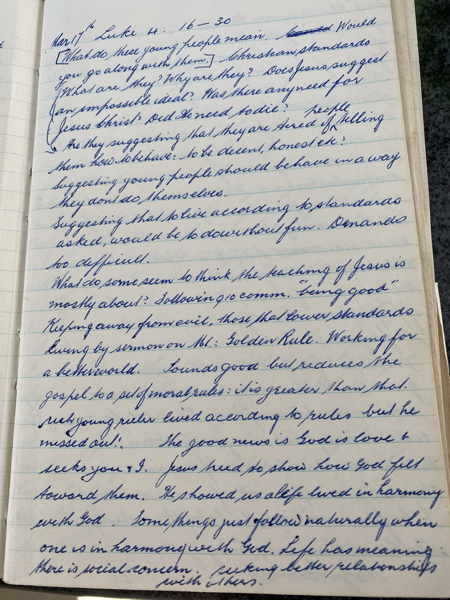
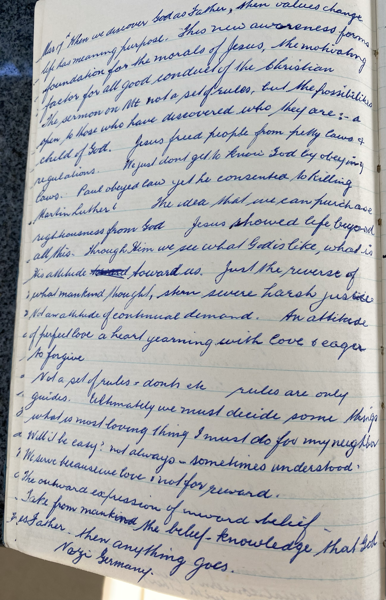
24th of March 1968
Matthew. 16:13-28 (JB Phillips Translation)
Peter’s bold affirmation
16:13 - When Jesus reached the Caesarea-Philippi district he asked his disciples a question. “Who do people say the Son of Man is?”
16:14 - “Well, some say John the Baptist,” they told him. “Some say Elijah, others Jeremiah or one of the prophets.”
16:15 - “But what about you?” he said to them. “Who do you say that I am?”
16:16 - Simon Peter answered, “You? You are Christ, the Son of the living God!”
16:17-20 - “Simon, son of Jonah, you are a fortunate man indeed!” said Jesus, “for it was not your own nature but my Heavenly Father who has revealed this truth to you! Now I tell you that you are Peter the rock, and it is on this rock that I am going to found my Church, and the powers of death will never prevail against it. I will give you the keys of the kingdom of Heaven; whatever you forbid on earth will be what is forbidden in Heaven and whatever you permit on earth will be what is permitted in Heaven!” Then he impressed on his disciples that they should not tell anyone that he was Christ.
Jesus speaks about his passion, and the cost of following him
16:21 - From that time onwards Jesus began to explain to his disciples that he would have to go to Jerusalem, and endure much suffering from the elders, chief priests and scribes, and finally be killed; and be raised to life again on the third day.
16:22-23 - Then Peter took him on one side and started to remonstrate with him over this. “God bless you, Master! Nothing like this must happen to you!” Then Jesus turned round and said to Peter, “Out of my way, Satan! … you stand right in my path, Peter, when you look at things from man’s point of view and not from God’s”
16:24-26 - Then Jesus said to his disciples, “If anyone wants to follow in my footsteps he must give up all right to himself, take up his cross and follow me. For the man who wants to save his life will lose it; but the man who loses his life for my sake will find it. For what good is it for a man to gain the whole world at the price of his own soul? What could a man offer to buy back his soul once he had lost it?
16:27-28 - “For the Son of Man will come in the glory of his Father and in the company of his angels and then he will repay every man for what he has done. Believe me, there are some standing here today who will know nothing of death till they have seen the Son of Man coming as a king.”
Jack Reginald Baker, March 24th 1968
Jesus wanting to know who people thought he was: At this time it was important, time running out.
What did people think about him? We have only a bare record. Not only those who followed, those who lived and heard—the relatives of people who had been helped etc. Hi enemies; scribes and Pharisees. Temple guards who were sent to arrest him and didn’t. He was watched—criticised, judged (by) many types:
- People who criticised Him for eating and drinking
- Amazed at His authority and how He was obeyed
- Judged him to be crazy
- Recognised Him [as] somebody who could be depended [upon]
- Convinced he was alive
- Recognised Him as a teacher, could help
I believe our reaction would be the same. I do not believe that it is possible to be challenged by Jesus and ever be the same again. Not all same experience. Makes Himself known in many ways. Critics of Jesus do not agree about Him: fanatic—mild; lacks genius—proposes beautiful impossible dream. Those who have discovered Him don’t debate—he is far beyond! The experience of airman, sportsman, scientist: experience beyond argument.
The airman: Named to die! at 21! saved. What for? What did he have. How he discovered a life to live [exciting build].
The sportsman: Did Ken Fraser lose ability, pleasure, fame? What have some sportsman left. It is put in its right place. My own experience.
The scientist: How much we owe! This man felt science could give mankind all they need. Yet he saw how little people had to live for, he became dissatisfied. He had no certainties, Jesus challenged him, his faith not quick.
People who knew Jesus recognised His authority, one who knew, experience. He often when to pray recognised the difference, asked to be taught. God gave man two ears, one mouth. Someone has suggested if we listened twice as much as we talked we would know where to begin—get instructions what to put right, what to go all out for. A step into the unknown—possibility of discovering some new truth. Not a set of laws, but the possibilities that are before us.
Does the world wait for people who will live God’s way, use the discoveries of science and modern communications to reach the possibilities. If we wait until we have all the answers we will never start. When we are willing to try, we will receive enough light for the next step.
- Though it is clear that Grandpa was thinking about Ken Fraser when talking about “the sportsman”, I do not know the identities of “the airman” or “the scientist” to which he was referring.
